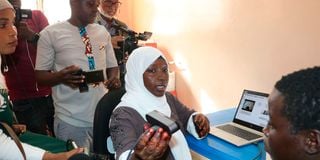Biometric vaccination tech for newborns rolled out

A Kemri official taking biometrics of Ms Mishi Gulu a few hours after she gave birth on May 11.
What you need to know:
- This is the first time that biometric identification is being used at a Kenyan hospital to identify newborns at the time of vaccination, including immediately after delivery.
- The new technology combines fingerprint identification for newborn children and voice recognition for caregivers to confirm not only their identity but also to reliably manage vaccination histories and schedules to promote the implementation of appropriate vaccination for newborns.
Mishi Gulu, 18, who comes from Kinango in Kwale County, one of the poorest sub-counties in Kenya, was excited when she gave birth to her first child on May 11, 2023.
The date coincided with the launch of a digital biometric-based vaccination management system for newborn children in Kenya. The digital biometric-based vaccination management system for newborns was developed by the Kenya Medical Research Institute (Kemri), NEC Corporation ( a Japanese multinational information technology and electronics corporation), and Nagasaki University in Japan.
Medics will be now tracking children’s vaccination until they attain five years, all thanks to the technology.
This is the first time that biometric identification is being used at a Kenyan hospital to identify newborns at the time of vaccination, including immediately after delivery.
As of November 2022, data from more than 300 caregivers and newborns had been registered, including the vaccination histories of more than 150 newborns.
The new technology combines fingerprint identification for newborn children and voice recognition for caregivers to confirm not only their identity but also to reliably manage vaccination histories and schedules to promote the implementation of appropriate vaccination for newborns.
“There are many things I don’t know due to illiteracy. But I am lucky that unlike my peers whose children missed some vaccines, my baby will not miss due to the development of this digital biometric-based vaccination management system,” said Ms Gulu.
Some of the vaccines administered to children are Hepatitis B, Meningitis A, Measles Mumps, Pneumococcal diseases, Polio, Rubella, Tetanus and Yellow Fever.
According to the World Health Organization, in 2021, 18.2 million infants worldwide did not receive an initial dose of the DTP vaccine, pointing to a lack of access to immunisation and other health services. An additional 6.8 million children are partially vaccinated.
The pilot project for the biometric technology is being conducted in Kinango Sub-county Hospital before its rollout across the country.
Kemri acting Director-General, Prof Elijah Songok, said a landmark study on identifying newborns using biometrics and a vaccination management system, which was done last year, will inject effectiveness for policy and action towards the attainment of better health outcomes and Universal Health Coverage.
“As Kemri, we identify innovations or discoveries that are beneficial to our people and partner with those who are developing them. This is a technology that begins two to four hours after birth of an infant,” said Prof Songok.
He noted that Kemri will work with other counties to roll out the technology.
“We will do a policy for the Ministry of Health, which will take up the technology and roll it across the country. This research is useful, applicable and has a long-term impact on the well-being of our people and health. But we got consent from parents and communities,” said the Kemri boss.
Prof Songok said the technology will improve adherence to vaccination. “Most of the deaths of our children occur below five years old, that is why we accept this technology. In this study we have 2,000 children.”
Vaccines prevent more than 20 life-threatening diseases, helping people of all ages live longer, healthier lives. WHO states that immunisation currently prevents 3.5-5 million deaths every year from diseases like diphtheria, tetanus, pertussis, influenza and measles.
Japan’s Ambassador to Kenya Okaniwa Ken said the Asian country is supporting Kenya’s health sector to boost development.
“The project is using technology to identify the fingerprints of a baby and be able to identify the person when he or she is older,” he said.
He said it is the first time the system is being tried globally while denying that Kenya is being used as a guinea pig. The ambassador said Japan and Kenya have a lot of cooperation in health including UHC.
“This is the reason they came to Kenya,” he added.
Kilifi Deputy Governor Chirema Kombo said the study is crucial to monitor the vaccination of the babies and those who will not be coming for immunisation.
“The study aims to improve the information capturing of all babies born in Kenya. As a county, we support the project, which has already been rolled out in Kwale Hospital and Diani health centre. It will replace immunisation cards,” said Mr Kombo.





